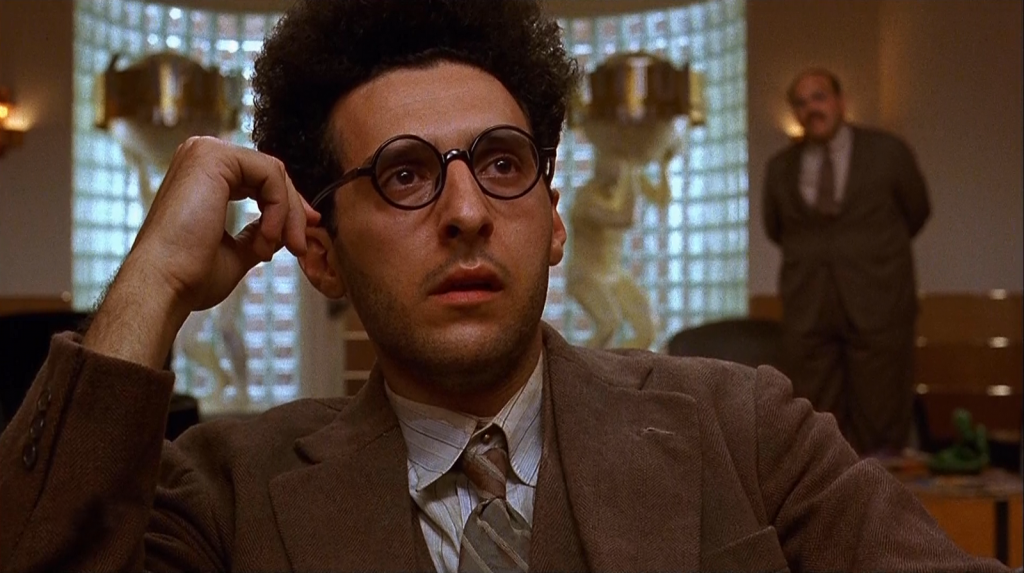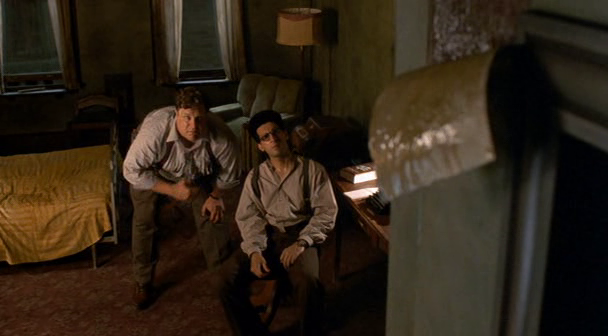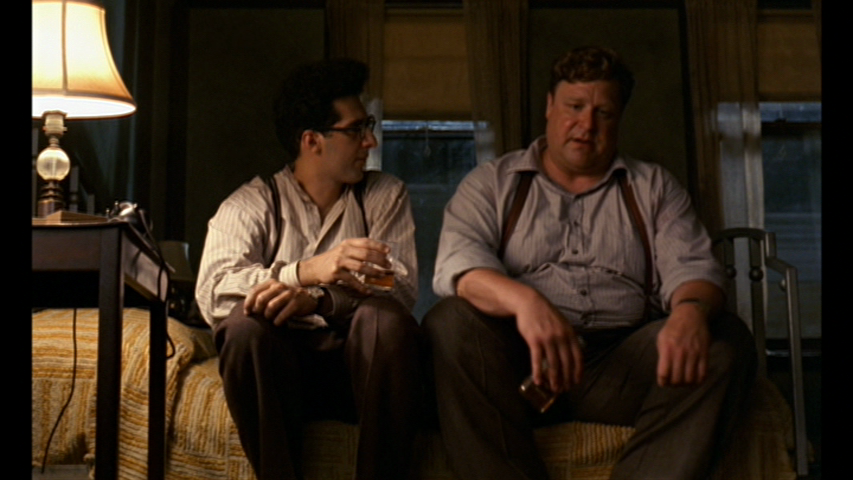Joel and Ethan Coen’s fourth feature film, Barton Fink was written in less than a month as a palette cleanser during the difficult scripting process for their third effort, Miller’s Crossing. That the film seems so preoccupied with the inner life of a man struggling to scribe a film himself may seem a little on the nose, but the Coens seem more interested in the role of the artist in society. Barton Fink (John Turturro), the titular figure, is a burgeoning playwright obsessed with what he perceives to be a new theater, one for and about the common man. He fancies himself a measured, humble, considerate artist who, unlike his peers and betters, devotes his creative powers to stories that the average Joe would appreciate, focusing on the drama of their lives rather than the machinations of high society stalwarts. Of course, this being a Coens movie, Fink is a complete fucking idiot and doesn’t have a damn clue who the common man really is or what that theoretical man could possibly want.
When we meet Fink, he’s just had a successful opening night for a play that’s about as ham-fisted and self-serious as any bit of the Raymond Carver adaptation at the heart of Birdman. Over the course of a post-show dinner, we see him demurely inquire about a review of his play in the Herald, twice. Each time he presents an image of an artist indifferent to the thoughts of critics, content to do the work and plow ahead. It’s a facade, obviously. This becomes increasingly apparent once he’s shipped off to LA from NYC, brought in as a contracted screenwriter for Capitol Pictures. Hollywood presents a fun house mirror reflection of reality where Fink’s preconceived notions of who he is and what he does go to die a thoroughly absurd heat death.
While in LA, Fink stays at the Hotel Earle, the Coens’ stab at a Shining-inspired hellscape with cavernous interior design and paint flaying from the walls like peeled flesh. There he bonds with one of the two men who come to define his time in Hollywood. Insurance salesman Charlie Meadows (John Goodman) is the kind of sturdy, thickly built “common man” Fink insists he writes his plays for. They develop an endearing bromance of sorts, but their interactions are founded upon depressing misconceptions Fink holds true of himself. He emphatically professes his tired mission statement to Charlie, humblebragging about how he’s so much more attentive than other writers who only want to hear themselves pontificate, all the while steamrolling Charlie’s repeated refrain that he’s got some stories of his own to tell.
There’s another man he develops a kinship with named W.P. Mayhew, a William Faulkner stand-in played with scenery chewing aplomb by Frasier vet John Mahoney. Mayhew, a novelist (high culture) who’s perpetually lubricated with whiskey to cope with his new low culture lifestyle in the movie business, is presented as something of a Ghost of Christmas Future for Fink. Producer Ben Geisler (a delicious turn from Tony Shaloub) tells Fink to link up with another writer to get a feel for the medium, but Mayhew is the wrong kind of influence. Fink may be clueless about who his audience truly is, but Mayhew’s stopped caring a long time ago. He’s been indoctrinated into the daily grind of churning out digestible yarns for the masses. When Fink discovers the true nature of his more recent output, he’s horrified, himself still obsessed with making work of substance.
Throughout the film’s barbed portrayal of Hollywood cynicism, every character who isn’t Fink has long since acclimated to the factory-like world of movie magic. Fink’s been tasked with writing a wrestling picture, and even though the medium is about as close to what “the common man” probably wants to see and might be inspired by, he can’t even begin to wrap his head around it. To the executives, it’s a simple B-movie. The kind of thing they throw together every other week. Fink wants to imbue it with poetry and heart. He mistakes what Jack Lipnick (Michael Lerner) calls “that Barton Fink feeling” with his singular artistic voice, unaware that the studio essentially hired him based off a positive review of a play no one there has ever seen or read. Fink bristles at Lipnick calling his art “a little fruity,” but as far from the mark as Lipnick may be about the medium, Fink is even more clueless.
That accusatory homophobia is echoed best in Fink and Charlie’s burgeoning friendship. Fink doesn’t understand wrestling even abstractly, so Charlie, an alleged former grappler, gets him on all fours and shows him a move or two. As the two grow closer, you expect Fink to come to the realization we the audience have long since surmised: that he’s an inattentive, condescending dickbag who will never produce meaningful art if he doesn’t learn to shut up and listen. Somehow, this never dawns on him. There’s even a scene where Fink finds his shoes have been delivered to the wrong room, swapped with Charlie’s, and Fink literally can’t walk in them. It’s hammered home pretty hard there, but nothing shouts it louder than Fink celebrating finishing the script by shouting in the face of soldiers at a dance about how his brain is his weapon. Nothing more tone deaf than bragging about writing a movie to men on their way to die during wartime.
Turturro captures all of this toxic pseudointellectualism with such endearing passion that his situation almost reads as tragic, but his cluelessness comes at a cost. His stubborn refusal to engage Charlie on a respectable level gets in the way of him seeing who Charlie really is, a miscalculation that leads to multiple deaths. John Goodman is a delight throughout the whole picture, but it’s in the film’s closing stretch when his true self is unleashed and he brings Fink’s world crashing down around him that his truly shines.
The Hotel Earle is a microcosm of the real life a lot of self centered artists shut themselves off from when they place themselves on a psychological pedestal above the people they purport to tell stories to. With his movie business contract and his callous decision to stay in so dreary a lodging, he’s slumming it for the craft, unwilling to acknowledge that there are men who live there without the choice not to. “Charlie” was one of those men and he doesn’t take kindly to this “tourist with a typewriter.” Nobody does.





